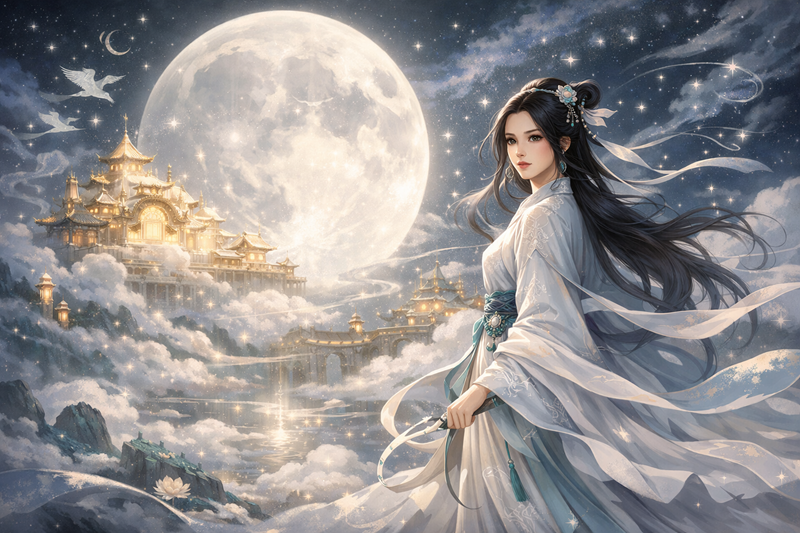Daughter of the Moon Goddess summary explores Sue Lynn Tan’s richly imagined fantasy novel inspired by Chinese mythology. It follows the journey of Xingyin, Chang’e’s daughter, as she seeks to free her mother from imprisonment and find her own destiny. Below is a comprehensive summary of Sue Lynn Tan’s Daughter of the Moon Goddess.

Daughter of the Moon Goddess Summary
In this Daughter of the Moon Goddess summary, the novel takes place in a mythical world inspired by Chinese folklore, where mortals, immortals, and celestial beings coexist. A Celestial Emperor and Empress govern the Immortal Realm and enforce strict laws over all immortals. At the center of the story is Chang’e, the moon goddess. She was banished to the moon for stealing the Elixir of Immortality meant for her husband, Houyi, the famed archer.
However, Chang’e consumed the elixir for herself, leaving her alone on the moon as punishment. She gives birth to Xingyin in secret. They live in isolation, with Xingyin unaware of her mother’s past and their precarious situation.
Xingyin’s quiet life on the moon is shattered when her latent powers begin to surface, alerting the Celestial Empress to her presence. Fearing that the Celestial Emperor and Empress will punish Chang’e for breaking the law (having a child), Xingyin is forced to flee the moon and hide her identity to protect her mother. She ventures into the Celestial Kingdom alone, determined to free Chang’e from her captivity.
Arriving in the Celestial Kingdom, Xingyin disguises her true identity and manages to enter the royal palace as a servant. She soon catches the attention of Prince Liwei, the son of the Celestial Emperor and Empress. Despite their vastly different statuses, the two develop a close friendship, and Liwei begins to train Xingyin in martial arts and archery. Xingyin excels in these areas, and her skills make her a formidable warrior over time.
Xingyin’s feelings for Liwei deepen as they grow closer. However, she is keenly aware of the vast social divide between them and the risks associated with revealing her true identity. Though their connection is strong, Xingyin remains focused on her mission to save her mother. Her resolve is tested when Liwei reveals that he is betrothed to Princess Fengmei, a political alliance arranged by his parents to strengthen their power.
Xingyin’s ambitions and talents catch the attention of General Jianyun, a renowned military leader in the Celestial Kingdom. He recruits her into the Celestial Army, where she begins her rise through the ranks. Her exceptional archery skills inherited from her father earn her respect and recognition from her peers. Though she faces many trials and battles, Xingyin proves herself to be a capable warrior, garnering both admiration and jealousy.
As she rises in prominence, Xingyin’s quest to free her mother becomes increasingly intertwined with the political dynamics of the Celestial Kingdom. Her growing influence brings her into conflict with powerful figures, including the Celestial Empress, who is suspicious of Xingyin’s motives. Meanwhile, her bond with Liwei remains a source of inner turmoil, as she struggles between her love for him and her desire to free her mother.
Xingyin’s relationship with Liwei evolves as they face dangers and challenges together, particularly as war looms in the Celestial Kingdom. Though they care deeply for each other, Liwei’s loyalty to his duty and family often conflicts with his personal desires. His betrothal to Princess Fengmei only heightens the tension between them.
Despite these complications, Liwei supports Xingyin’s ambitions, even as she becomes more entangled in the celestial court’s political web. He remains a source of strength for her, but Xingyin cannot ignore the gulf between their positions. Her dedication to her mother’s cause clouds her feelings for Liwei, making their relationship fraught with uncertainty.
During her time in the army, Xingyin meets Wenzhi, a mysterious and charismatic captain. Wenzhi’s character adds complexity to the story, as he becomes both a friend and a rival to Xingyin. While Liwei represents Xingyin’s past and her ties to the Celestial Court, Wenzhi symbolizes her future and the choices she must make on her own path.
Wenzhi quickly becomes a close companion to Xingyin, and the two form a bond that is more than just friendship. Their relationship evolves into a romantic one, though Xingyin remains torn between her lingering feelings for Liwei and the burgeoning connection she shares with Wenzhi. Throughout their journey together, Wenzhi’s motives remain ambiguous. His true allegiance is often questioned by both Xingyin and the reader.
As Xingyin grows more powerful and gains favor in the Celestial Kingdom, she becomes embroiled in a series of betrayals, conspiracies, and tests of loyalty. The novel expertly balances Xingyin’s personal journey with the larger political and mythical elements of the world. She navigates through treacherous waters, not knowing whom to trust.
Xingyin’s quest takes her on a journey beyond the Celestial Kingdom, where she faces trials, monstrous enemies, and powerful beings. Along the way, she uncovers secrets about her past, her father Houyi, and the Elixir of Immortality. These revelations help her better understand the forces that led to her mother’s imprisonment and strengthen her resolve to save Chang’e.
In the midst of her journey, Xingyin discovers that Wenzhi is not who he seems. He is revealed to be a prince from the Demon Realm. His intentions toward her and the Celestial Kingdom are far more dangerous than she could have imagined. This betrayal devastates Xingyin, but it also clarifies her purpose: she must stop Wenzhi’s plot and prevent the Demon Realm from threatening the Celestial Kingdom.
The climax of the novel is an epic battle between the Celestial Kingdom and the forces of the Demon Realm. Xingyin plays a crucial role in this conflict, using her archery skills and wit to outmaneuver her enemies. She must confront Wenzhi, torn between her lingering feelings for him and her duty to protect the realm. Their final confrontation is a test of Xingyin’s strength, not just as a warrior but as a person who must navigate difficult moral choices.
Though the battle is hard-fought, Xingyin ultimately prevails, proving herself not only as a warrior but as a leader. She defeats Wenzhi, though the cost is great, and the victory feels bittersweet.
With the battle won, Xingyin turns her attention back to her original goal: freeing her mother. Having gained the favor of the Celestial Emperor through her bravery and loyalty, she finally secures an audience with him to plead for her mother’s release.
The Emperor grants her wish, but the price is steep. In exchange for Chang’e’s freedom, Xingyin must give up her place in the Celestial Kingdom. She willingly makes this sacrifice, knowing that her mother’s freedom is worth more than her own status or happiness.
In the end, Xingyin returns to the moon, where her mother is finally free, but her own future remains uncertain. She has fulfilled her mission but at great personal cost. She reunites with Chang’e, but she must now forge a new path for herself, free from the constraints of the celestial court and her former ambitions.
Themes of Daughter of the Moon Goddess
Daughter of the Moon Goddess is a novel that explores themes of duty, sacrifice, love, and identity, which is prominent from the above summary. Xingyin’s journey is not just one of physical battles but of emotional and moral growth. She constantly struggles to balance her love for those around her with her sense of duty to herself and her family’s legacy.
The novel also delves into the complex relationships between parents and children, particularly the bond between Xingyin and Chang’e. Throughout the story, Xingyin grapples with her mother’s past choices and the consequences they have had on her own life. Her quest to free her mother becomes a metaphor for her own journey towards independence and self-actualization.
Love is also a central theme, with Xingyin navigating the delicate balance between her heart’s desires and her responsibilities. Her relationships with Liwei and Wenzhi represent two different paths. One is rooted in loyalty to the Celestial Kingdom, and the other is the allure of power and freedom.
Ultimately, Xingyin’s story is one of resilience and determination. She emerges from her trials stronger and wiser, having carved out her own place in the world. Her journey is far from over, but she has taken the first steps toward a future shaped by her own choices.
Frequently Asked Questions (FAQs)
1. Is Daughter of the Moon Goddess based on a specific myth?
Ans. Yes, the novel is inspired by the ancient Chinese legend of Chang’e, the moon goddess. Sue Lynn Tan draws from this myth, particularly Chang’e’s separation from her loved ones on earth, and reimagines it through the perspective of her fictional daughter, Xingyin.
2. Is Daughter of the Moon Goddess a standalone book or part of a series?
Ans. Daughter of the Moon Goddess is the first book in The Celestial Kingdom duology. The second book, Heart of the Sun Warrior, continues Xingyin’s story and concludes the series.
3. What themes are explored in Daughter of the Moon Goddess?
Ans. The novel explores themes such as love, sacrifice, resilience, identity, and the pursuit of freedom. Xingyin’s journey addresses the complexities of family loyalty and independence, as well as the challenges of balancing duty with personal desires.
4. Who would enjoy reading Daughter of the Moon Goddess?
Ans. Fans of East Asian mythology, fantasy, and character-driven stories with rich world-building would enjoy Daughter of the Moon Goddess, as evident from the above summary. Readers who appreciate stories with strong female protagonists and intricate fantasy settings will likely find it captivating.
5. What is Daughter of the Moon Goddess about?
Ans. This Daughter of the Moon Goddess summary focuses on Xingyin’s quest to free her mother, Chang’e, from exile while navigating love, war, and celestial politics.
Conclusion
In the above summary of Daughter of the Moon Goddess, it is evident that Sue Lynn Tan crafts a compelling and vibrant tale that blends mythology, adventure, and romance. Xingyin’s journey from a sheltered girl to a powerful warrior is both epic and deeply personal, resonating with universal themes of love, sacrifice, and self-discovery. The novel’s richly detailed world and complex characters make it a captivating read for fans of fantasy and folklore alike.
Recommended: The Lightning Thief | Summary, Characters and Themes
About the Author
Sue Lynn Tan is a Malaysian-born author known for her enchanting fantasy series inspired by Chinese mythology. Her debut novel, Daughter of the Moon Goddess, is a captivating tale of love, adventure, and destiny. Tan’s writing is praised for its vivid world-building and compelling characters, making her a rising star in the fantasy genre.




